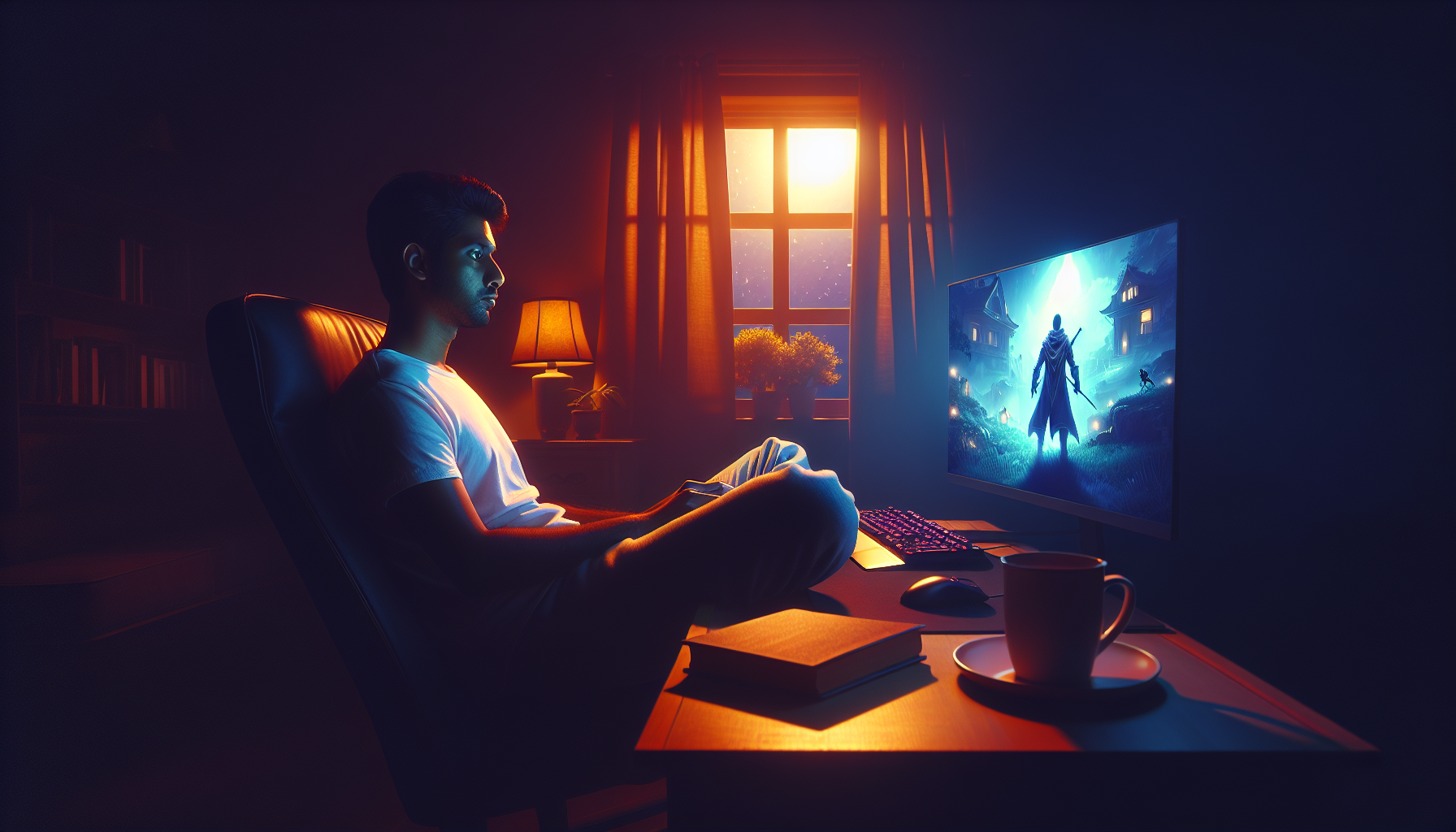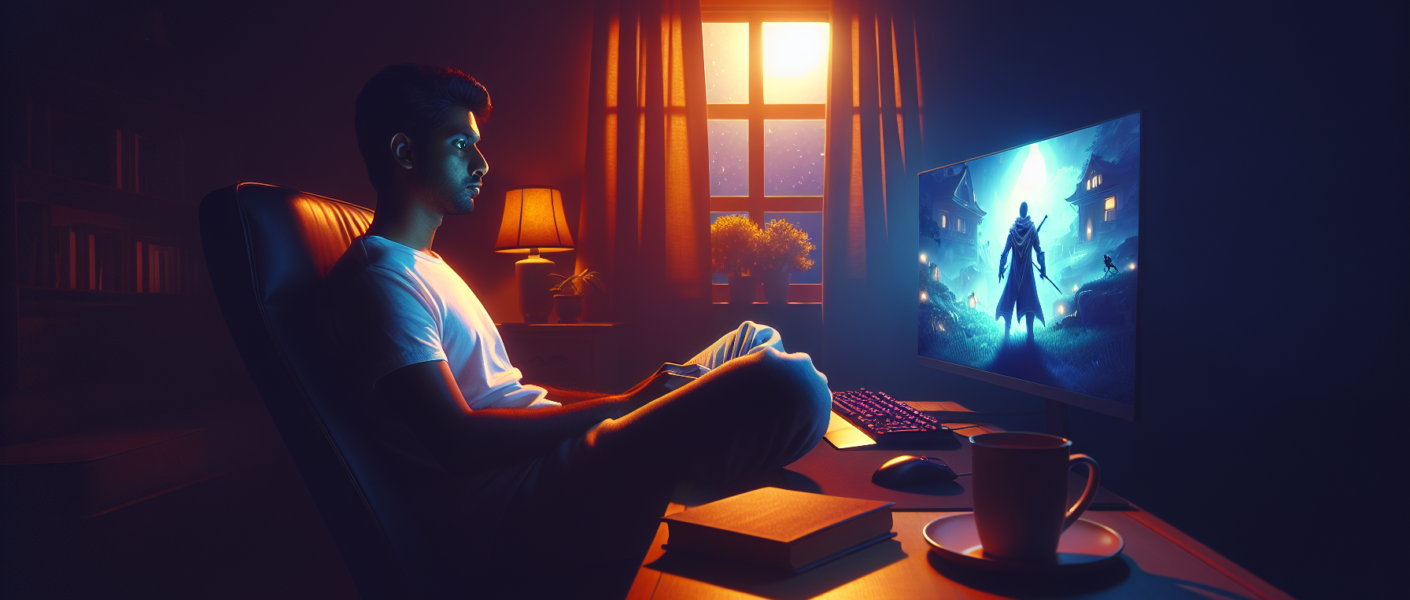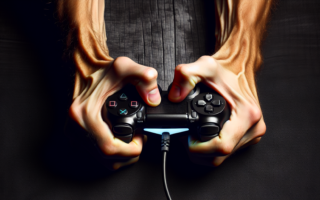You’ve always admired your boyfriend’s dedication to his job, but lately, there’s been a puzzling phenomenon that you can’t help but wonder about. No matter how early he has to wake up the next morning for work, he still finds himself staying up late into the night, completely absorbed in his gaming sessions. As you lay beside him, sleep eluding your tired eyes, you can’t help but question why he chooses virtual quests over rest and how it may be impacting your relationship.

Effects of Late-Night Gaming on Sleep Quality
Impact of late-night gaming on sleep patterns
Late-night gaming can have a significant impact on sleep patterns. The bright screens and stimulating gameplay can make it difficult for the brain to relax and wind down, leading to delays in falling asleep. Additionally, the excitement and adrenaline rush from gaming can interfere with the body’s natural sleep-wake cycle, also known as the circadian rhythm. This disruption can result in irregular sleep patterns and difficulty achieving deep, restorative sleep.
The relationship between sleep deprivation and gaming addiction
Sleep deprivation and gaming addiction often go hand in hand. When individuals regularly sacrifice sleep to engage in gaming activities, they become prone to developing addictive behaviors. Lack of sleep impairs judgment and decision-making abilities, making it more difficult to resist the allure of gaming. In turn, excessive gaming further disrupts sleep, creating a vicious cycle that perpetuates the addiction.
The role of gaming in disrupting circadian rhythms
Circadian rhythms play a crucial role in regulating sleep-wake cycles and maintaining overall health. Late-night gaming can disrupt these rhythms, as the bright screens and engaging gameplay can trick the brain into thinking it’s daytime, inhibiting the release of melatonin, a hormone that promotes sleep. The prolonged exposure to stimulating visual and auditory stimuli can also delay the body’s natural signal for sleep, further disrupting the circadian rhythms.
Psychological Factors Influencing Late-Night Gaming
Escapism and stress relief
One of the primary psychological factors that drive individuals to engage in late-night gaming is the desire for escapism and stress relief. Gaming provides an immersive experience that allows individuals to momentarily forget about their real-life problems and challenges. The virtual world offers an opportunity to unwind and escape from the stressors of daily life, providing a temporary respite from the pressures and responsibilities.
Competitiveness and the fear of missing out
The competitive nature of gaming can also contribute to late-night gaming habits. The fear of missing out (FOMO) on exciting gaming events or opportunities can drive individuals to stay up late, even when they know they should prioritize sleep. The desire to excel, rank high on leaderboards, or be part of a competitive gaming community can create a sense of urgency to stay engaged in the game, leading to late nights and compromised sleep.
The desire for personal achievement and progress in the game
Many individuals find fulfillment and a sense of accomplishment through gaming. The desire to achieve personal goals, level up characters, or complete challenging quests motivates them to dedicate extensive hours to gaming, even at the expense of sleep. The sense of progression and achievement in the game can create a strong psychological pull, making it difficult for individuals to tear themselves away and prioritize their sleep needs.

Effects of Social Interaction in Online Gaming
Building and maintaining friendships
Online gaming offers a unique platform for individuals to build and maintain friendships. The ability to connect with like-minded individuals, collaborate on missions, and engage in friendly competition fosters a sense of camaraderie and social connection. Late-night gaming often occurs to align with the schedules of gaming friends, as it provides an opportunity for bonding and shared experiences, strengthening these virtual friendships.
The allure of virtual communities
In online gaming, individuals can become part of virtual communities known as guilds, clans, or teams. These communities offer a sense of belonging and identity, where individuals can interact with others who share similar interests and passions. The allure of being a valued member of these communities and the social validation that comes with it can compel individuals to prioritize late-night gaming, as it ensures their active involvement and participation.
Need for social connection and acceptance
Humans are inherently social creatures, and the need for social connection and acceptance is a fundamental psychological driver. Late-night gaming provides individuals with an opportunity to fulfill this need by engaging in multiplayer games, team-based competitions, and coordinated strategies. The social aspect of gaming offers a sense of belonging and acceptance, making it difficult for individuals to step away and prioritize sleep.
Understanding Gaming Addiction
Defining gaming addiction
Gaming addiction, also known as Internet Gaming Disorder, refers to the uncontrollable and compulsive use of video games that leads to significant impairment in various areas of life. It is characterized by symptoms such as excessive preoccupation with gaming, withdrawal symptoms when not gaming, failed attempts to control or reduce gaming, and continued gaming despite negative consequences.
Signs and symptoms of gaming addiction
Signs of gaming addiction may manifest both physically and mentally. Physically, individuals may experience symptoms such as fatigue, headaches, backaches, and changes in appetite and sleep patterns. Mentally, they may exhibit increased irritability, agitation, difficulty concentrating, and a preoccupation with gaming thoughts. Neglecting personal hygiene, academic or work responsibilities, and withdrawing from social interactions are also common signs of gaming addiction.
Contributing factors to gaming addiction
Numerous factors contribute to the development of gaming addiction. Psychological factors, such as high levels of stress, low self-esteem, and a desire for escapism, can make individuals more vulnerable to addiction. Additionally, social factors, such as a lack of social support, limited face-to-face interactions, and the competitive nature of online gaming, can increase the risk of gaming addiction. Furthermore, underlying mental health conditions, such as depression or anxiety, may also play a role in the development of addictive gaming behaviors.

The Role of Work Stress in Gaming Behaviors
Work-related stress as a trigger for gaming
Work-related stress can act as a trigger for late-night gaming behaviors. After a long and demanding workday, individuals may turn to gaming as a means to decompress and escape from the pressures of their job. Gaming provides a temporary relief from work stress, allowing individuals to shift their focus and immerse themselves in a different reality. The immediate gratification and sense of control that gaming offers can be enticing, making it difficult to resist, especially when faced with high levels of work-related stress.
Escaping the pressures of work through gaming
Gaming provides a form of escapism from the pressures and responsibilities of work. Individuals may feel a need to detach from their work identities and immerse themselves in the virtual world, where they can be someone else, free from the stresses and expectations of their professional lives. The engaging gameplay and captivating narratives offer an opportunity to temporarily forget about work-related concerns and immerse themselves in a more enjoyable and controllable environment.
The perceived lack of control over work-life balance
The perceived lack of control over work-life balance can contribute to late-night gaming behaviors. When individuals feel overwhelmed and stressed by their work responsibilities, they may turn to gaming as a way to regain a sense of control over their lives. By staying up late gaming, they are asserting their autonomy and indulging in an activity that brings them pleasure and fulfillment, even if it comes at the cost of sacrificing sleep and neglecting other aspects of their lives.
Supportive Measures for Addressing Late-Night Gaming
Open communication and understanding
Open and honest communication is essential when addressing late-night gaming habits. Engage in a non-confrontational conversation with a loved one about their gaming habits, expressing your concerns and sharing your perspective. Approach the conversation with empathy and understanding, acknowledging the positive aspects of gaming while discussing the potential negative impacts on sleep and overall well-being. Encourage them to share their thoughts and feelings surrounding their gaming habits, fostering a supportive and collaborative approach to finding solutions.
Setting boundaries and creating a schedule
Establishing clear boundaries and creating a schedule can help regulate late-night gaming habits. Work together to set specific gaming time limits and designate certain nights as gaming-free to ensure sufficient time for rest and rejuvenation. Encourage them to adhere to the schedule and hold them accountable for honoring the agreed-upon boundaries. By creating structure and setting limits, individuals can develop healthier gaming habits that prioritize sleep and overall well-being.
Seeking professional help when necessary
If late-night gaming habits become problematic and significantly impact an individual’s daily life and relationships, it may be necessary to seek professional help. Mental health professionals, such as therapists or counselors, can provide support and guidance in addressing gaming addiction and developing healthier coping mechanisms. They can help individuals explore the underlying emotional and psychological factors contributing to their late-night gaming habits and develop strategies to achieve a more balanced lifestyle.

The Importance of Self-Reflection and Self-Care
Encouraging self-awareness of gaming habits
Encouraging self-awareness of gaming habits is a crucial step in addressing late-night gaming. Encourage individuals to reflect on their gaming behaviors, considering the time and energy invested in gaming and the impact it has on their well-being. Promote self-reflection by asking questions that help individuals explore their motivations for gaming and identify any negative consequences it may have on other areas of their lives. By fostering self-awareness, individuals can make more informed choices regarding their gaming habits.
Exploring alternative hobbies and interests
Gaming addiction often stems from a lack of balance in one’s life. Encourage individuals to explore alternative hobbies and interests that promote overall well-being and provide a sense of fulfillment. Engage them in discussions about their other passions, hobbies they used to enjoy, or new activities they may want to try. By diversifying their interests and investing time and energy into other fulfilling pursuits, individuals can reduce their reliance on late-night gaming and develop a more balanced and enriched lifestyle.
Prioritizing self-care and well-being
Prioritizing self-care and well-being is essential when addressing late-night gaming habits. Encourage individuals to focus on activities that promote relaxation and rejuvenation, such as getting regular exercise, practicing mindfulness or meditation, and engaging in hobbies that promote stress relief. Emphasize the importance of maintaining a healthy lifestyle with adequate sleep, proper nutrition, and social connections. By prioritizing self-care, individuals can enhance their overall well-being and reduce the likelihood of relying on late-night gaming as a coping mechanism.
Seeking a Balance in Gaming and Responsibilities
Understanding the importance of setting priorities
Seeking balance in gaming and responsibilities requires individuals to understand the importance of setting priorities. Help individuals assess their various obligations, such as work, relationships, self-care, and hobbies, and evaluate how gaming fits into their overall life goals. By identifying and organizing priorities, individuals can allocate appropriate time and energy to each area, ensuring that gaming does not overshadow other essential aspects of their lives. This self-reflection can empower individuals to make intentional choices regarding their gaming habits and achieve a healthier balance.
Creating a healthy balance between gaming and work
Achieving a healthy balance between gaming and work is crucial for maintaining overall well-being. Encourage individuals to set boundaries and allocate specific time blocks for gaming while ensuring they still fulfill their work responsibilities. Emphasize the importance of time management and efficient work practices to maximize productivity during allocated work hours. By creating a structured approach to gaming and work, individuals can find a harmonious balance that allows for the enjoyment of gaming without compromising professional success.
Making compromises and finding common ground
When addressing late-night gaming habits, it is important to make compromises and find common ground. Recognize that gaming may hold significant value and enjoyment for the individual, and completely eliminating it may not be realistic or desirable. Instead, work together to find a mutually agreeable solution that respects the individual’s passion for gaming while also prioritizing sleep and overall well-being. Look for opportunities to compromise on gaming schedules or find alternative ways to engage in gaming activities that do not interfere with sleep patterns or other responsibilities.

The Impact of Disrupted Sleep on Overall Well-being
Effects of sleep deprivation on physical health
Disrupted sleep resulting from late-night gaming can have significant implications for physical health. Sleep deprivation is associated with a range of adverse effects, including increased risk of obesity, heart disease, diabetes, and weakened immune system. Lack of quality sleep also impairs cognitive function, reaction times, and decision-making abilities, which can negatively impact productivity, safety, and overall physical performance. By prioritizing sleep and addressing late-night gaming habits, individuals can protect their physical health and well-being.
Mental health implications of inadequate sleep
Inadequate sleep resulting from late-night gaming can have profound implications for mental health. Sleep deprivation is closely linked to various mental health conditions, such as depression, anxiety, and increased stress levels. The disrupted sleep-wake cycle can disrupt the brain’s neurotransmitters and hormone production, leading to mood disturbances, irritability, and decreased emotional resilience. By prioritizing sufficient sleep and addressing late-night gaming, individuals can support their mental well-being and reduce the risk of developing mental health issues.
Strategies for improving sleep quality
Improving sleep quality is crucial for overall well-being and should be a priority for individuals struggling with late-night gaming habits. Implementing a consistent sleep routine, creating a sleep-conducive environment, and practicing healthy sleep habits, such as avoiding screens before bed and practicing relaxation techniques, can significantly enhance sleep quality. Additionally, maintaining a regular exercise routine, managing stress levels, and avoiding stimulants such as caffeine and nicotine can also promote better sleep. By adopting these strategies, individuals can improve their sleep quality and reap the benefits of a well-rested mind and body.
Conclusion
Late-night gaming can have significant effects on sleep quality and overall well-being. The psychological factors driving late-night gaming, the impact of social interaction in online gaming, the understanding of gaming addiction, and the role of work stress all contribute to the prevalence of late-night gaming habits. However, through supportive measures, self-reflection, and seeking a balance in gaming and responsibilities, individuals can address their late-night gaming habits and prioritize their sleep and overall well-being. By recognizing the importance of sleep and taking proactive steps to improve sleep quality, individuals can experience the numerous benefits of a well-rested mind and body.



